|
Seattle, Charlotte:
Light Rail Future Depends on Nov. 2007 Vote
Light Rail Now Project Team – November 2007
Critical transit measures that would impact the prospects for rail transit development –
particularly light rail transit (LRT) – in both Seattle, Washington and Charlotte, North Carolina,
will be on the ballot before voters in those cities on Tuesday, 6 November 2007.
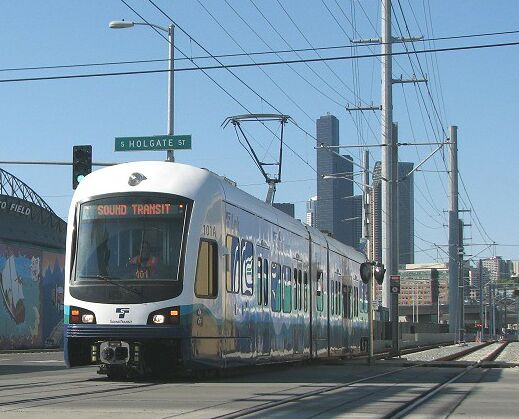 Seattle: Roads & Transit Plan Backed by Rail Advocates
Seattle: Roads & Transit Plan Backed by Rail Advocates
Light rail transit development in the Seattle-Tacoma-Puget Sound region would get a huge boost if Proposition 1, a combined highway and transit measure, is passed by voters.
[Photo of Seattle LRT: Mac Photography]
According to Seattle's Roads and Transit organization, "Sound Transit and the Regional
Transportation investment District (RTID) Planning Committee have teamed up on an integrated long-term proposal for improving the region's transportation system."
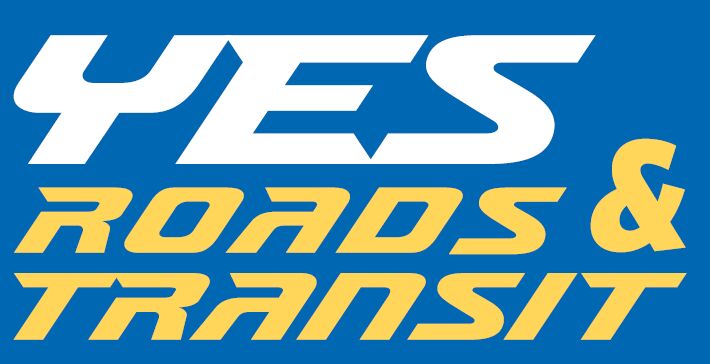 With funding from Prop. 1, the transit agency's Sound Transit 2 plan would expand the regional mass transit system currently in
operation or under construction, including about 50 miles of new light rail service.
According to the Roads and Transit coalition, "Expansion focuses on high capacity transit facilities
and services and would almost double Sound Transit ridership to a projected 359,000 per day in
2030, reliably moving people through the region's most congested corridors."
With funding from Prop. 1, the transit agency's Sound Transit 2 plan would expand the regional mass transit system currently in
operation or under construction, including about 50 miles of new light rail service.
According to the Roads and Transit coalition, "Expansion focuses on high capacity transit facilities
and services and would almost double Sound Transit ridership to a projected 359,000 per day in
2030, reliably moving people through the region's most congested corridors."
The Regional Transportation investment District (RTID) Planning Committee is likewise responsible
for "developing a plan to improve significant highways and bridges in Snohomish, King and Pierce
Counties" (these counties basically span the Puget Sound region from north of Seattle to Tacoma on
the south).
According to the Seattle Times (9 September 2007), priced in 2006 dollars, the $10.8
billion transit plan offered in Prop. 1 would extend Sound Transit's LRT east to the Overlake area of Seattle's exurb of
Redmond, south to Tacoma, and north to 164th Street Southwest in Snohomish County.
Included in the plan is the enhancement of existing regional passenger rail ("commuter rail") and
regional bus service.
The plan would also allocate about $7 billion on more than two dozen highway and local road
projects, including widening interstate 405 and improving Mercer Street in Seattle.
Almost $1 billion would go toward replacing the Highway 520 floating bridge.
New HOV lanes as well as general purpose lanes in the major highway corridors plus safety
improvements on key regional bridges are included in the package.
To finance this program, voters are being asked to approve the following new taxes (from Roads and
Transit website):
· A sales tax increase of an additional six-tenths of one percent (0.5% for Sound Transit, 0.1%
for RTID), or 6 cents on a $10 retail purchase.
This would be authorized in areas located within both the Sound Transit and RTID districts.
However, in the area of Snohomish County outside the Sound Transit District, the proposed sales tax
increase is less – one-tenth of one percent.
(Currently, Sound Transit collects a sales tax of four-tenths of one percent or 4 cents on a $10 retail
purchase.)
· An extra motor vehicle excise tax of eight-tenths of one percent (0.8% MVET, or car tabs) or
$80 for every $10,000 of vehicle value.
This would be available to RTID only, and would be based on a new depreciation schedule that
would more accurately reflect the market value of vehicles.
(Currently, Sound Transit collects MVET of three-tenths of one percent or $30 for every $10,000 of
vehicle value.)
According to the Sep. 12th Seattle Times, when inflation, financing, operations,
overhead, and cash reserves are added, the entire package is projected to cost around $38 billion by
the time all the projects are finished 20 years from today.
Sound Transit's existing tax revenues are now being used to build and operate Sound Move, the
foundation of the regional transit system approved by voters in 1996.
According to Roads & Transit,
If the voters approve the Roads & Transit ballot proposition, then Sound Transit would use existing
taxes to help build Sound Transit 2 projects. If the ballot proposition is not approved, then the existing
taxes will continue to be used for Sound Move capital and operations expenses. After construction is
complete, Sound Transit taxes will be reduced to the level needed for operations, maintenance and
debt service.
Because of the lash-up of both transit and highway investment in the package, some Seattle-area
transit advocates have defected from support, and joined opponents of the measure – putting
them in a very unsavory alliance with some of the most virulent opponents of transit (and
supporters of highway/motor vehicle dependency) in the Seattle region.
For example, the Sierra Club has joined the opposition, claiming the plan spends too much on
highways, promotes pollution, and contributes to global warming.
Thus the region's Sierra Club is listed alongside the ferociously anti-LRT Coalition for Effective
Transportation Alternatives (CETA) and various other anti-transit organizations and individuals as
members of the No To Prop. 1 group fighting the pro-transit measure.
This is an exceedingly dangerous, unprincipled, and untenable position for nominal supporters of public transport, including rail, to take.
This position may also signal a move further to the right, and away from commitment to public transport, by the local Sierra Club.
Although the group has traditionally been considered an advocate of light rail,
recently it has joined opponents of extending the Link LRT line to Tacoma, claiming it "doesn't make
much sense", according to the Seattle Times of November 1st.
(Sound Transit planners disagree, arguing that by the time the route is completed, LRT trains would
beat buses to Seattle because of growing traffic congestion – thus attracting strong ridership.)
The critical need for transit supporters to support the transit measure on the ballot was underscored in a recent
op-ed article by US Rep. Jay inslee in the October 31st Seattle Post-Intelligencer.
Rep. Inslee, described by the paper as "a congressional expert on global warming", is also co-author
of Apollo's Fire: igniting America's Clean Energy Economy, a book on the clean-energy revolution.
As Rep. Inslee notes,
Concerns about the environment have been used to justify opposition to Proposition 1.
It's time to debunk that myth. Approving Prop. 1 to expand transit options and unclog traffic
bottlenecks is consistent with local efforts to reduce carbon-dioxide emissions and lead the nation in the fight against global warming.
For starters, Prop. 1 is heavily weighted to transit-related investment, with 75 percent of funds
dedicated to light rail, high-occupancy vehicle lanes, park and rides, and road investments that will make transit more efficient and reliable.
Fifty miles of light rail in Prop. 1 will give commuters options other than roads.
As inslee emphasizes, some of the greatest benefits of massive LRT and overall transit expansion
will take many years to come to fruition – for example, "Light rail expansion also will drive
development of dense, walkable communities."
in addition to extending the reach of the LRT system, he notes, "Prop. 1 also would improve bus
service, create new bike lanes and add HOV lanes – additional means of getting commuters
out of single-passenger cars."
Rep. Inslee's conclusion relects the viewpoint of most rail transit planners and proponents:
This plan is consistent with our efforts to transition from a transportation system based on oil. We
cannot kill a plan to create a truly regional light rail system and consider ourselves leaders in clean
energy. It's time to take bold action by passing Prop. 1.
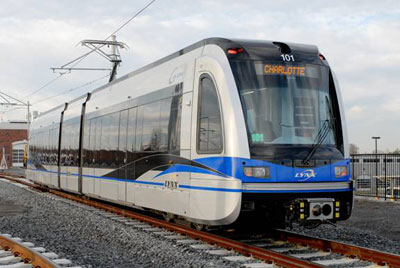 Charlotte: Anti-Transit Tax Repeal Measure Opposed by Rail Advocates
Charlotte: Anti-Transit Tax Repeal Measure Opposed by Rail Advocates
While Seattle-area voters are being asked to vote Yes for the pro-transit Prop. 1, in the urban area of Charlotte, North Carolina, supporters of transit are being asked to vote No to defeat an anti-transit measure on the ballot,
if they wish to continue developing rail and other transit alternatives in
the Charlotte-Mecklenburg County urban region.
[Photo of Charlotte LRT: CATS]
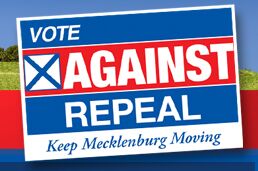 As the commentary from Citizens for Efficient Mass Transit (CEMT), titled
Charlotte: Future of Public Transit System Depends on November Vote
(published by Light Rail Now) emphasizes,
As the commentary from Citizens for Efficient Mass Transit (CEMT), titled
Charlotte: Future of Public Transit System Depends on November Vote
(published by Light Rail Now) emphasizes,
It is important to people living in the Charlotte/Mecklenburg area that we retain the half-cent sales tax
earmarked for transit.
This is true whether you are a transit rider, or drive your car and never use public transportation.
CEMT backs this up with an array of data and solid arguments, including:
· 60 to 70% of the money collected from the transit-dedicated sales tax currently is used to
operate Charlotte's bus system – thus, if the tax is rescinded, either bus service will be slashed,
or other taxes will be raised to maintain essential service.
· For motorists, transit will make driving easier – easier than it would be without transit
taking traffic off the road.
"Despite what anti-rail, anti-transit people say, public transportation will help forestall ever-increasing
congestion."
· Light rail will save taxpayers' money in the long run – particularly because LRT
minimizes operating costs.
· Transit Oriented Development "will pay for the cost of installing light rail several times over,
not to mention raising property values everywhere along its right-of-way."
As the CEMT commentary concludes,
For all the above reasons and many more, we need a good, attractive, cost-effective public
transportation system in the Charlotte/Mecklenburg area. A healthy system badly needs
the funding that the half-cent transit sales tax provides. Now is not the time to turn back the clock on
something as vitally important to our future!
This is why Citizens for Efficient Mass Transit is asking voters to vote NO on the
repeal of the transit sales tax at the referendum this November.
In their latest newsletter (Summer 2007), CEMT point out that Charlotte transit opponents have
continued their flim-flam of the voting public by playing games over the issue of "saving tax money".
"Was There Ever Any Real Attempt to 'Save the Tax Payer Money'?" asks the nerwsletter's lead
article – pointing out that transit opponents have been falsely claiming they could
reallocate the transit tax to a wide variety of other purposes (schools, in the one case illustrated in the article).
On the basis of other transit opponents' statements in the ongoing campaign, these opponents have
a wide range of alternative spending priorities in mind, ranging from schools to jails to more highways.
As the CEMT newsletter points out, Charlotte transit opponents are deceiving the voting public,
because, as in the case of the example they cite, such opponents are "simply playing the old game of
taking money out of one pocket and putting it in another."
in the case of the particular opponent the article highlights, people solicited to sign a petition to
revoke the transit tax were told to "sign this to cut your taxes".
This promise, notes the CEMT, "was never anything more than a scam" because the intent of this
particular transit opponent "was never to do away with the half cent sales tax, only to redirect it to his favorite cause."
Others behind the transit tax repeal are also trying to "reinvest" the transit tax in their favorite cause,
although they are not all on the same page as to what that cause should be.
Recently retired UNCC Professor Hartgen has indicated he would like to take at least half the transit tax funds and use it to build more highways.
It would seem the people behind the transit tax repeal see the half cent sales tax for transit as simply a money pot, ripe for plundering.
In a Nov. 1st pro-transit editorial, the Charlotte Observer
urged readers to "Vote 'against' repeal'", with the subhead, "Charlotte region needs reliable funding
for mass transit" – in other words, to support continued funding for transit:
The Charlotte-Mecklenburg region is now home to 1.4 million people, and some 200,000 more are projected to join us each decade.
Our region must have a good road system, and state and federal funding has not kept pace with needs.
But our growing region cannot thrive without public transportation choices that include bus service and light rail.
This referendum is about how we pay for that necessary resource.
Nine years ago, voters approved a half-penny sales tax that is a fair and consistent source of revenue.
We urge you to vote against repeal of that tax on Tuesday's ballot.
To justify their strong endorsement of public transit, the Observer offered the following arguments:
· Though most criticism of the transit plan has centered on rail, more than two-thirds of the $77
million the half-cent nets each year pays for an expanded bus system that is essential to our region's economy.
Repeal of the transit tax will not halt the South Corridor light rail line, thought it probably would delay
or prevent future rail projects. But here's the important effect: it will force cuts in bus service that will
hurt the needy, the elderly and the economy unless local governments raise other taxes substantially
to make up for the lost sales-tax revenue. Tax increases of that magnitude are highly unlikely.
· Charlotte-Mecklenburg's population grew 19 percent in the past six years, according to the
latest Census estimate. That follows a 26.7 percent increase from 1990 to 2000. Such fast-growing
metropolitan areas will choke on congestion and asphalt if they depend solely on building roads for
transportation. Need proof? Look at Houston and Los Angeles, overwhelmed by traffic and faced with
costly retrofitting for transit options such as rail.
Investing in mass transit won't mean fewer cars on the road in 30 years than there are today. It will
mean fewer cars on the road than there would be otherwise. That's critical. And it will mean that
people who can't drive, or choose not to, will have an affordable, reliable way to get to work by bus or
rail.
In conclusion, the Observer focuses on the fact that
This is a defining moment for Charlotte. Public transportation is a long-term investment whose full
value may not be evident for decades.
We believe it's imperative that Charlotte-Mecklenburg continue making that investment if it is to
sustain its growth and remain a place people want to live. Voters should mark the ballot against
repeal.
Light Rail Now! website
URL: http://www.lightrailnow.org/news/n_lrt_2007-11a.htm
Updated 2007/11/04
More on Public Transit in Seattle
More on Public Transit in Charlotte
More on Rail Transit initiative Campaigns
More on Transit industry Policy & Political issues...
|
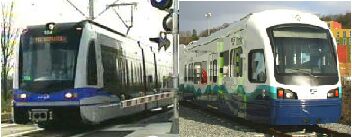 Charlotte and Seattle LRT
Charlotte and Seattle LRT